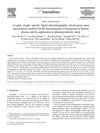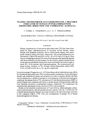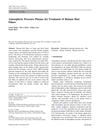 16 citations,
December 2016 in “Molecular Medicine Reports”
16 citations,
December 2016 in “Molecular Medicine Reports” Platelet-rich plasma may help hair follicle cells grow by affecting certain genes and pathways.
 15 citations,
March 2018 in “Journal of The American Academy of Dermatology”
15 citations,
March 2018 in “Journal of The American Academy of Dermatology” PRP therapy improves hair density and thickness in AGA patients, even with other treatments.
 15 citations,
March 2007 in “Journal of Pharmaceutical and Biomedical Analysis”
15 citations,
March 2007 in “Journal of Pharmaceutical and Biomedical Analysis” Method measures finasteride in plasma, suitable for pharmacokinetic studies.
 12 citations,
December 2020 in “Frontiers in Cell and Developmental Biology”
12 citations,
December 2020 in “Frontiers in Cell and Developmental Biology” The review found that the way Platelet-Rich Plasma is made varies a lot, which can change the results of medical treatments.
 12 citations,
October 2017 in “Journal of Cosmetic Dermatology”
12 citations,
October 2017 in “Journal of Cosmetic Dermatology” Combining plasma rich in growth factors with hair transplant surgery may lead to faster recovery and better outcomes for hair loss treatment.
 11 citations,
June 2017 in “Journal of cell science”
11 citations,
June 2017 in “Journal of cell science” AGD1's PH domain is essential for its role in root hair growth and polarity.
 10 citations,
April 1995 in “Animal Science/Animal science”
10 citations,
April 1995 in “Animal Science/Animal science” Melatonin implants can change the seasonal prolactin levels and hair growth in adult cashmere goats but not in juveniles, and don't delay spring moult for better fiber harvesting.
 8 citations,
January 2016 in “European Journal of Plastic Surgery”
8 citations,
January 2016 in “European Journal of Plastic Surgery” PRGF treatment is safer and more effective for hair loss than topical minoxidil.
 6 citations,
November 1980 in “Clinical Endocrinology”
6 citations,
November 1980 in “Clinical Endocrinology” Measuring plasma testosterone glucosiduronate is a reliable way to detect high male hormone levels in women.
 5 citations,
May 2020 in “Diagnostics”
5 citations,
May 2020 in “Diagnostics” Lower zinc levels may predict less effective hair loss treatment.
 5 citations,
April 2017 in “Dermatologic Surgery”
5 citations,
April 2017 in “Dermatologic Surgery” PRP treatment satisfies 58% of female hair loss patients, with most noticing fuller, thicker hair and less shedding.
 5 citations,
February 2015 in “Journal of Bio- and Tribo-Corrosion”
5 citations,
February 2015 in “Journal of Bio- and Tribo-Corrosion” Plasma jet treatments can clean hair and might replace peroxide for hair care.
 4 citations,
October 2020 in “JAAD Case Reports”
4 citations,
October 2020 in “JAAD Case Reports” Platelet-rich plasma may improve vitiligo treatment when used with phototherapy.
 1 citations,
January 2014 in “Hair therapy & transplantation”
1 citations,
January 2014 in “Hair therapy & transplantation” Platelet-rich plasma treatment is not very effective for chronic severe alopecia areata.

Monthly PRP therapy is more effective than daily minoxidil for alopecia areata.

A standardized consent form for PRP injections improves patient trust and legal protection.

Plasma gel and PRP treatments improve skin and hair with minimal side effects.
 April 2021 in “JOJ dermatology & cosmetics”
April 2021 in “JOJ dermatology & cosmetics” The combined laser and plasma jet therapy effectively regrew hair in a woman with alopecia areata.
 April 2021 in “Journal of Investigative Dermatology”
April 2021 in “Journal of Investigative Dermatology” An AI photographic device effectively tracked hair growth improvements in women treated for hair loss.
 June 2020 in “The journal of investigative dermatology/Journal of investigative dermatology”
June 2020 in “The journal of investigative dermatology/Journal of investigative dermatology” Platelet-rich Plasma Gel may help treat en coup de sabre scleroderma, improving symptoms and skin quality with minimal side effects.
 January 1986 in “Journal of Steroid Biochemistry”
January 1986 in “Journal of Steroid Biochemistry” Lower testosterone levels in men may be linked to a higher risk of severe coronary artery disease.
 823 citations,
February 1998 in “Analytical Chemistry”
823 citations,
February 1998 in “Analytical Chemistry” Method detects finasteride in plasma at very low concentrations.
 87 citations,
September 2016 in “Dermatologic Surgery”
87 citations,
September 2016 in “Dermatologic Surgery” PRP shows potential for treating female hair loss, but more research needed.
 69 citations,
April 2019 in “Biomedicines”
69 citations,
April 2019 in “Biomedicines” PRP and HF-MSCs treatment improves hair growth, thickness, and density in androgenetic alopecia.
 61 citations,
January 2015 in “Indian Journal of Plastic Surgery”
61 citations,
January 2015 in “Indian Journal of Plastic Surgery” Platelet-rich plasma treatment could potentially be an effective way to treat chronic alopecia areata with minimal side effects.
 57 citations,
May 2016 in “Journal of Dermatological Treatment”
57 citations,
May 2016 in “Journal of Dermatological Treatment” PRP therapy may effectively treat hair loss, but more research needed.
 56 citations,
November 2016 in “Aesthetic surgery journal”
56 citations,
November 2016 in “Aesthetic surgery journal” The document concludes that the effectiveness of platelet rich plasma in aesthetic surgery is unclear due to inconsistent reporting and lack of objective measures in studies.
 54 citations,
December 2014 in “Wound Repair and Regeneration”
54 citations,
December 2014 in “Wound Repair and Regeneration” PRP injections may improve hair thickness and density in female hair loss patients.
 46 citations,
May 2018 in “Dermatologic Surgery”
46 citations,
May 2018 in “Dermatologic Surgery” PRP injections effectively treat hair loss, with positive results in both monthly and every three months treatments.
 37 citations,
May 2018 in “Journal of Cosmetic Dermatology”
37 citations,
May 2018 in “Journal of Cosmetic Dermatology” PRP shows promise for hair loss treatment, but needs standardized preparation and composition.






























